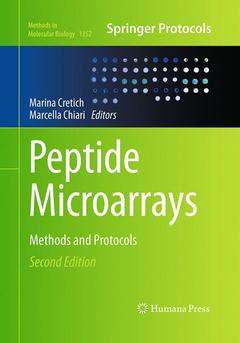Description
Peptide Microarrays (2nd Ed., Softcover reprint of the original 2nd ed. 2016)
Methods and Protocols
Methods in Molecular Biology Series, Vol. 1352
Coordinators: Cretich Marina, Chiari Marcella
Language: English
Subjects for Peptide Microarrays:
Support: Print on demand
Support: Print on demand
Description
/li>Contents
/li>Comment
/li>
This expert volume provides insights into the technological fundamentals together with a comprehensive overview of the potentialities of peptide microarray technology in basic research and clinical assays. Advancements made in recent years in peptide library synthesis, immobilization chemistry and array production have created a foundation from which different new applications are derived, extending the ways in which peptide microarray technology is applied every day. Divided into three sections, the book covers cutting-edge methods and technology, chemoselective strategies for peptide immobilization, and peptide microarrays for medical applications. Written for the high successful Methods in Molecular Biology series, chapters include introductions to their respective topics, lists of the necessary materials and reagents, step-by-step, readily reproducible protocols and tips on troubleshooting and avoiding known pitfalls.
Fully updated and authoritative, Peptide Microarrays: Methods and Protocols, Second Edition seeks to encourage scientists to apply current peptide array protocols to the study of interesting new biochemical and medical questions and to assist researchers aiming at developing new methods to further develop peptide microarray technology.
Part I: Peptide Arrays: Cutting-Edge Methods and Technology
1. Peptide Arrays on Planar Supports
Víctor Tapia and Rudolf Volkmer
2. High-Throughput Microarray Incubations Using Multi-Well Chambers
Johannes Zerweck, Ulf Reimer, Janina Jansong, Nikolaus Pawlowski, Christoph Tersch, Maren Eckey, and Tobias Knaute
3. Analysis of Protein Tyrosine Kinase Specificity Using Positional Scanning Peptide Microarrays
Yang Deng and Benjamin E. Turk
4. Secondary Structure Determination of Peptides and Proteins After Immobilization
Stella H. North and Chris R. Taitt
5. Peptides and Anti-Peptide Antibodies for Small and Medium Scale Peptide and Anti-Peptide Affinity Microarrays: Antigenic Peptide Selection, Immobilization, and Processing
Fan Zhang, Andrea Briones, and Mikhail Soloviev
6. Low-Cost Peptide Microarrays for Mapping Continuous Antibody Epitopes
Ryan McBride, Steven R. Head, Phillip Ordoukhanian, and Mansun Law
7. The Peptide Microarray-Based Resonance Light Scattering Assay for Sensitively Detecting Intracellular Kinase Activity
Tao Li, Xia Liu, Dianjun Liu, and Zhenxin Wang
8. Anomalous Reflection of Gold: A Novel Platform for Biochips
Amir Syahir, Kin-ya Tomizaki, Kotaro Kajikawa, and Hisakazu Mihara
9. High Throughput Peptide Screening on a Bimodal Imprinting Chip Through
MS-SPRi IntegrationWeizhi Wang, Qiaojun Fang, and Zhiyuan Hu
10. Analyzing Peptide Microarray Data with the R pepStat Package
Gregory Imholte, Renan Sauteraud, and Raphael Gottardo
Part II: Chemoselective Strategies to Peptide Immobilization
11. Chemoselective Strategies to Peptide and Protein Bioprobes Immobilization on Microarray Surfaces
Alessandro Gori and Renato Longhi
12. Manufacturing of Peptide Microarrays Based on Catalyst-Free Click Chemistry
Denis Prim and Marc E. Pfeifer
13. Clickable Polymeric Coating for Oriented Peptide Immobilization
Laura Sola, Alessandro Gori, Marina Cretich, Chiara Finetti, Caterina Zilio, and Marcella Chiari
14. Oriented Peptide Immobilization on Microspheres
Lisa C. Shriver-Lake, George P. Anderson, and Chris R. Taitt
15. A Cell Microarray Format: A Peptide Release System Using a Photo-Cleavable Linker for Cell Toxicity and Cell Uptake Analysis
Kenji Usui, Kin-ya Tomizaki, and Hisakazu Mihara
Part III: Peptide Microarrays for Medical Applications
16. Peptide Microarrays for
Medical Applications in Autoimmunity, Infection, and CancerCarsten Grötzinger
17. Synthetic Peptide-Based ELISA and ELISpot Assay for Identifying Autoantibody Epitopes
Judit Pozsgay, Eszter Szarka, Krisztina Huber, Fruzsina Babos, Anna Magyar, Ferenc Hudecz, and Gabriella Sarmay
18. IgE and IgG4 Epitope Mapping of Food Allergens with a Peptide Microarray Immunoassay
Javier Martínez-Botas and Belén de la Hoz
19. IgE Epitope Mapping Using Peptide Microarray Immunoassay
Gustavo Gimenez, Sara Benedé, and Jing Lin
20. Spot Synthesis: An Optimized Microarray to Detect IgE Epitopes
Salvatore G. De-Simone and Paloma Napoleão-Pêgo
21. Mapping of Epitopes Occurring in Bovine αs1-Casein Variants by Peptide Microarray Immunoassay
Maria Lisson and Georg Erhardt
Includes cutting-edge methods and protocols for peptide microarray study
Provides step-by-step detail essential for reproducible results
Contains key notes and implementation advice from the experts
Includes supplementary material: sn.pub/extras
These books may interest you

Peptide Synthesis and Applications 210.99 €

Peptide Synthesis and Applications 137.14 €


